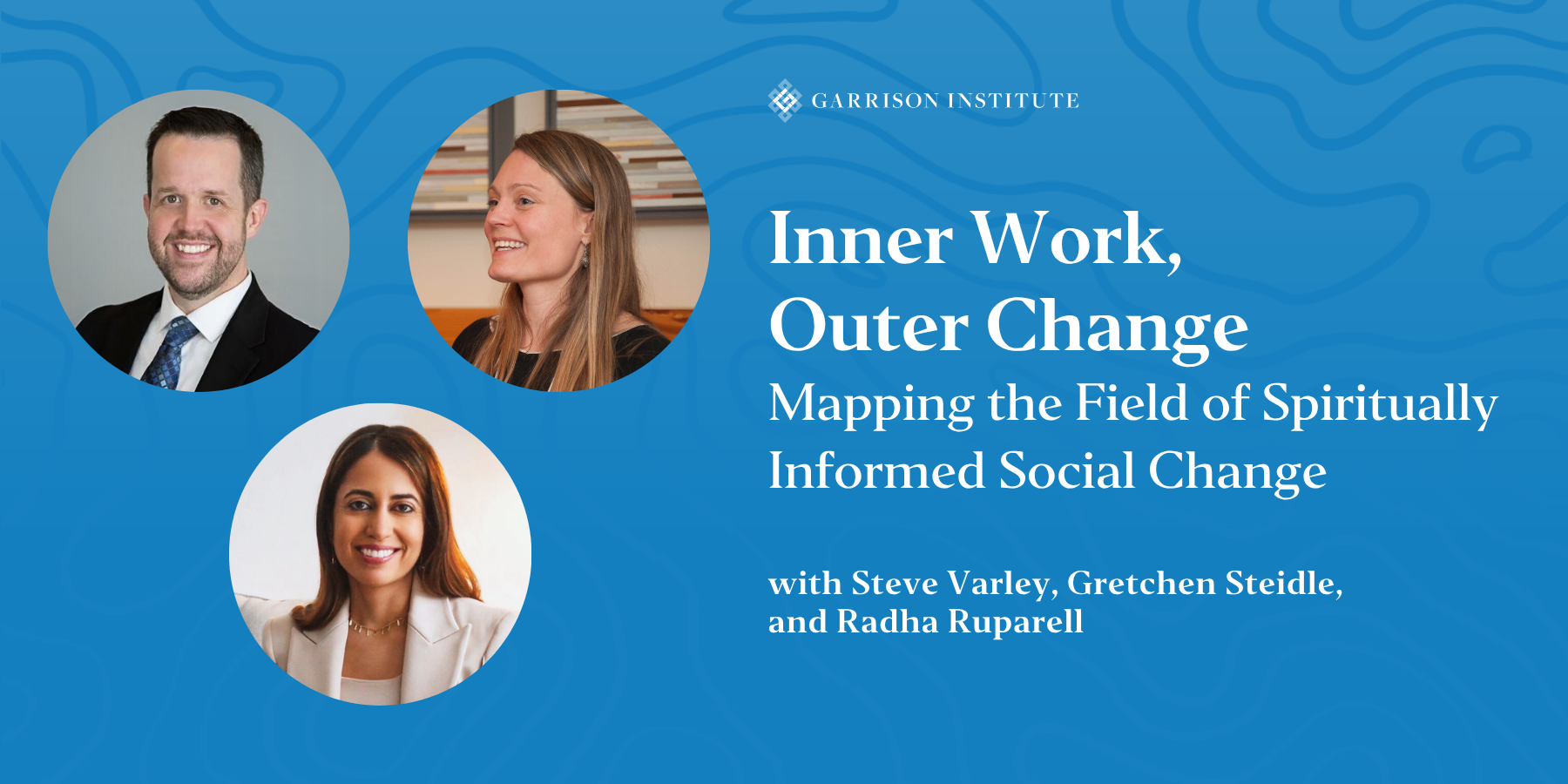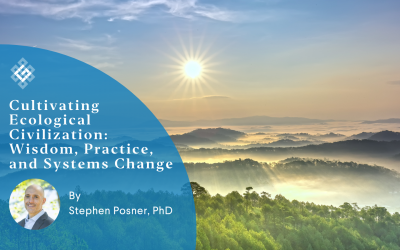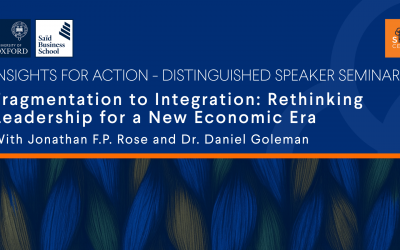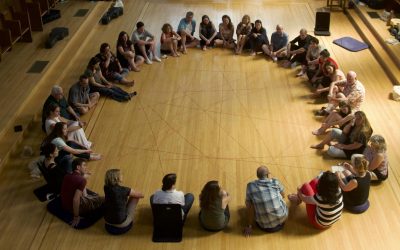“You cannot change a system unless you transform consciousness. You cannot transform consciousness unless you can make a system see and sense itself” — Otto Scharmer
Recently, the Garrison Institute unveiled the Conscious Change Collective – a new social systems map of organizations around the world applying contemplative practice for social transformation. This is not only a community working towards transforming consciousness, but also a growing field the Collective is helping make visible.
A webinar on September 22, 2025, brought together Steve Varley, Garrison Institute’s Managing Director; Gretchen Steidle, Director of the Spirituality and Social Change Program at Garrison, which guides the project; and one of the project’s Senior Advisors, Radha Ruparell, Head of the Global Leadership Accelerator at Teach For All. Together, they offered a window into an emerging field where inner development, collective leadership, and systemic change meet.
A Map of Interconnection
The Spirituality and Social Change Program began with a simple purpose: to identify, learn from, and amplify this diverse and remarkable field where contemplative practice, spirituality, and inner work intersect with social change.
The project rests on the Garrison Institute’s perspective that organizations grounded in contemplative or spiritual practice are not only resilient, but offer innovative and effective methods for creating belonging and achieving systemic impact. To examine this premise, the Institute has undertaken this multi-year, generative field-building initiative to make visible and learn from the vast network of organizations embodying this integration.
This project builds upon a long history of Garrison Institute initiatives mapping and supporting generative field building. Steve Varley noted, “If we can build connections across movements, we can attract resources, strengthen connections, build collaborations…then a true field of practice emerges. Workers and leaders can recognize themselves as part of that kind of coherent, generative ecosystem. And that recognition is potent, especially, I think, when we’re…at our limits, with the magnitude of the task that we have.”
At the heart of this work is the Conscious Change Collective map, built in partnership with Circles for Conscious Change, an organization specializing in the use of mindfulness for social innovation. Created using the Kumu data visualization platform and sumApp, a social systems networking tool, the map currently includes nearly 325 organizations from grassroots initiatives to global networks. Each “node” in the map reflects an organization’s unique constellation of contemplative practices, social issues addressed, and communities served — from mindfulness in education to trauma healing, from climate action to transformative justice.
Steidle described the project as a living ecosystem, one that allows practitioners to find each other, recognize shared values, collaborate and learn across the sector. The map illuminates not only who is doing the work, but also how they are doing it — the modalities they use and how they function in their program models, their theories of change, their core values, and the relationships that sustain their impact.
As the map populates with each organization’s insights and approach, it represents a growing wealth of wisdom about what is emerging within the field, where is common ground, who is missing, and what the community needs to be able to support each other – just as mycelial networks function in natural ecosystems.
From the beginning, the program has been guided by a diverse group of spiritually driven practitioners, ensuring its design and implementation would be by and for the field. “We wanted this to be not just a one-time snapshot of who’s who, doing what within the world, but a live, dynamic and evolving community,” Steidle explained.
“And so that is why we are calling this a collective, and why it has been from the very beginning field-driven, field-organized and designed. We hope that over time the collaborations that are sparked from the wisdom we are surfacing and the growth of this network will prove to serve as a generative field and that this itself will determine where we go next as a community.”
Inner Work for Outer Change
The forum conversation turned from the map to its meaning — to what this field of practice reveals about the relationship between inner and outer change, as evidenced by the work of one of its members and Senior Advisors.
As Director of Teach For All’s Global Leadership Accelerator, Radha Ruparell helps nurture the inner capacities of educators and social entrepreneurs across more than sixty countries. The network mobilizes thousands of locally rooted leaders working toward equitable education systems.
Yet, as Ruparell noted, “To transform systems, we need collective leadership. We can’t change systems out there without doing the inner work in here. The relational work…starts with this deep, deep inner work”
Her decade of work has shown that sustainable systems change depends on leaders’ ability to be in relationship with each other, to pause and see the larger system, and to recognize our interconnectedness. These inner capacities allow for building authentic relationships, advancing justice, and co-creating together. And yet, Teach for All is often operating in contexts where there exists significant trauma. The inner work includes individual healing, seen as a collective responsibility, where such inner change helps transform the systems we are operating in and creating.
Ruparell shared how the Accelerator’s programs combine neuroscience and contemplative practices with cultural wisdom — from Buddhist teachers in Nepal to Māori facilitators in New Zealand — creating experiences where participants move “from stress to centered, from disconnected to connected, from reactive to generative.”
The results are both personal and systemic. In Vietnam, one project found resistance to introducing contemplative practice in schools, so they started doing outreach to parents, community members, politicians, and school leaders to invite them to experience the practices.
As a result of the personal experiences with practice and human connection, the project has gone beyond its own sphere of schools to shift policy at the national level. “When we embody compassion ourselves,” Ruparell reflected, “we begin to re-pattern the systems around us.” The question Teach for All is grappling with now is “how do we scale with depth?”
Building a Generative Field
The Conscious Change Collective, Steidle explained, seeks to make visible and strengthen this very movement at scale and with depth — the networks of practitioners and organizations who, like Teach For All, are integrating inner and outer transformation. The Collective can serve as a community for funders to explore how best to fund collaboratively the greatest needs that are emerging from the field. It also represents an extensive database that is available for researchers who may want to explore deeper research questions across the sector.
Participants in the map are already engaging in collective inquiry: exploring common language across faiths, exploring the mechanisms of a particular modality and how it contributes to social innovation, or unpacking the underlying assumptions and their roots that influence our perspectives and approaches.
As more groups join, the map is revealing hubs of concentration, helping to identify missing voices, and offering a community of wisdom representing where the field is growing and the work it needs to do next.
Equally important, it is fostering a sense of belonging among practitioners who once felt isolated, offering a space for connectivity. “Again, you know, if we can pause and slow down and learn to be with one another and learn to see ourselves as interconnected…we actually get to the deeper, deeper roots of these challenges,” Ruparell explained.
The map creates a home for shared learning and collaboration: from how to communicate about contemplative practice to how to measure impact holistically in ways that honor complexity. As the movement grows, so then does the legitimacy of these approaches too, strengthening a network of both mutual nourishment and co-creation, where insight flows both inward and outward.
A Living Invitation
As the webinar closed, Steidle and Varley invited listeners to join the Collective — to refer organizations or reach out directly to become part of this community. The Conscious Change Collective is eager to engage organizations that align with the community’s values and those that integrate inner work, spirituality or contemplative practice within programs for social change.
In the months ahead, the Garrison Institute will continue deepening this work through ongoing research, virtual gatherings, and an in-person convening from March 24-27, 2026, to showcase the field. There, participants will come together to celebrate what is emerging: a global movement committed to transforming systems by transforming ourselves.
In a time when urgency and fragmentation dominate public life, this work reminds us that true change begins not with speed or scale, but with presence. And as we see and sense ourselves as an actual field of work, and perhaps an alternative paradigm, we have the potential collectively to transform systems as well as consciousness.
Watch the full forum:
About the Speakers
Radha Ruparell serves as Head of Global Leadership Accelerator at Teach for All. Radha is a global cross-sector expert in personal transformation and collective leadership, having worked with CEOs, Fortune 500 executives, social entrepreneurs, and grassroots leaders around the world. She also serves as a Chief Learning Officer for the Global Institute for Shaping a Better Future where she focuses on inner leadership and system-wide change. Previously, Radha was a consultant at McKinsey & Company, advising CEOs and senior executives on growth strategy, organizational transformation, and innovation. She is also the co-founder of Y2Y (Youth to Youth), the largest movement of young leaders bringing innovative ideas to the World Bank. Radha is the author of Brave Now and co-editor of What Leadership We Need Now?
Gretchen Steidle serves as the Director of Garrison Institute’s Spirituality & Social Change initiative. She is the author of Leading from Within: Conscious Social Change and Mindfulness for Social Innovation (MIT Press, 2017) and lectures and teaches on mindfulness and social change worldwide. Gretchen is also the Founder and President of Circles for Conscious Change, a transformative education firm working with social entrepreneurs, nonprofits, and corporations on the use of mindfulness as a design tool for social innovation. She is also the founder and President of Global Grassroots, an international organization that operated a social venture incubator and mindful-leadership program for women and girls in East Africa.
Steve Varley serves as the Managing Director at the Garrison Institute. Steve’s prior experience includes leadership roles at prominent organizations such as National Public Radio (NPR) and the University of North Carolina (UNC). His leadership at UNC Pembroke resulted in record-breaking fundraising years and was defined by his orientation of service and partnership toward the local community and the Lumbee Tribe. Previously, Steve served as associate dean of advancement at Yale University, completing a long term of service in health-related fundraising and global health initiatives. Prior to Yale, he was the vice president of development at Gardner-Webb University, where he spearheaded the Higher Ground capital campaign, the university’s most successful fundraising effort in its history.




